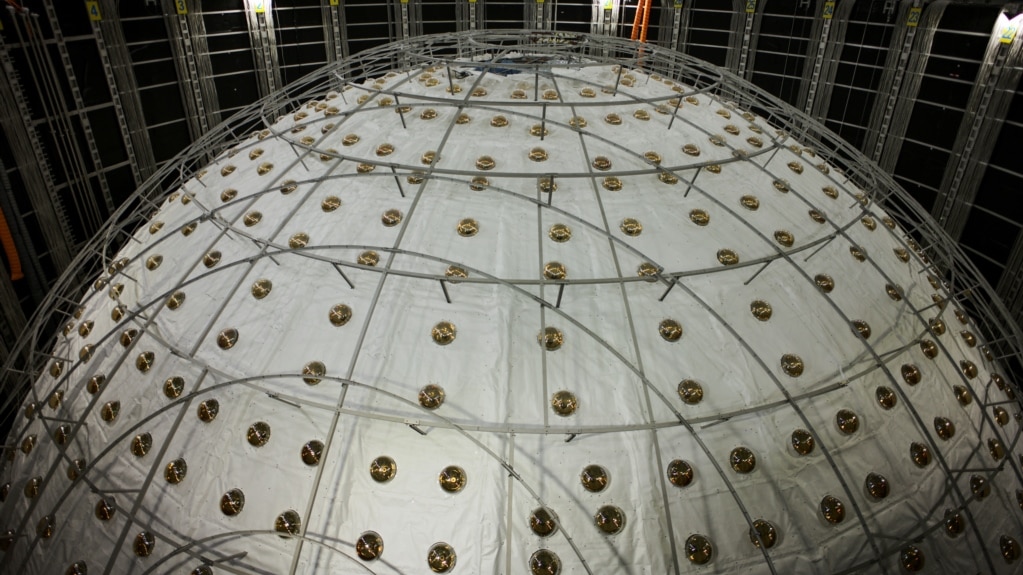China plans to start operations of a huge experiment next year that aims to observe subatomic particles called neutrinos.
The goal is to gather information that will help physicists better understand matter itself. That information will help solve one of the biggest mysteries in particle physics.
The Jiangmen Underground Neutrino Observatory, or JUNO, is in China’s southern Guangdong province. It is expected to begin operations in 2025.
Reporters with the Reuters news agency recently reported on the laboratory in China. It also reported on similar efforts in the United States.
What is JUNO?
The JUNO center has cost more than $300 million to build. Part of it is a 35-meter-tall sphere that is 700 meters underground. A huge pool of water holds the sphere. The JUNO center also contains tens of thousands of tubes, which can sense and intensify light. They will be put in place in the coming months.
Chinese physicists and scientists from around the world are expected to study data on neutrinos from the center for up to six years. They will be hoping to find neutrinos that are produced by two nearby nuclear power stations.
JUNO is also expected to be able to observe neutrinos from the sun and from radioactive materials in the Earth. The hope is that studying such neutrinos will add to knowledge of solar processes and the forces that move the Earth’s surface.
What is DUNE?
JUNO is expected to go into operation before a similar but much larger project in the United States. That project is called the Deep Underground Neutrino Experiment, or DUNE.
DUNE is part of an effort overseen by Fermilab, the top particle physics laboratory of the U.S. Department of Energy, or DOE. The whole experiment is known as the Long-Baseline Neutrino Facility, or LBNF.
The LBNF has two main parts: one in South Dakota and the other in Illinois. However, DUNE is not expected to be complete until 2030. The experiment has had several delays and its estimated cost has gone past $3 billion.
Wang Yifang is chief scientist and project manager of JUNO. Wang recently spoke to Reuters during a media event supported by the Chinese government.
Wang said, “China had supported Fermilab’s LBNF at the time, but later the cooperation could not continue.” Wang added that “Around 2018-2019, the U.S. DOE asked all national laboratories not to cooperate with China, so Fermilab was forced to stop working with us.”
The DOE did not answer Reuters’ request for comment.
Sino-U.S. relations affected
Tensions between China and the U.S. have increased in recent years. In August, a science and technology agreement between China and the U.S. lapsed. The agreement dated back to when the U.S. recognized mainland China in 1979.
Supporters are concerned that the current situation will create duplication of research. They also say more scientists will seek different partners or miss out on chances to cooperate that could have led to useful discoveries.
Reuters says that institutions from France, Germany, Italy, Russia, the U.S. and Taiwan are involved in JUNO.
Neutrino observatories are also being built in other places.
Wang told Reuters, "The one in the U.S. will be six years behind us. And the one in the France and in Japan, they will be two or three years later than us. So we believe that we can get the result of mass hierarchy (of neutrinos) ahead of everybody."
“Mass hierarchy” is a complex question behind neutrinos that has to do with the mass of different kinds of neutrinos. The question of the mass states of neutrinos is considered a major mystery in particle physics.
So far, real-life neutrino use remains a distant possibility. Some scientists say neutrinos could be used to send long-distance messages because they can pass through solid matter at nearly the speed of light.
One U.S. group remains in JUNO. The group’s leader says it has support from the National Science Foundation.
There were more than 12 U.S. organizations involved in an earlier neutrino project in China called the Daya Bay experiment.
Pedro Ochoa-Ricoux is with the University of California, Irvine. He said, “I believe that through our collaboration on this scientific endeavor, we are setting a positive example that may contribute, even in a small way, to bringing our countries closer together.”
How data from JUNO will be shared
JUNO aims to record neutrinos passing from nuclear power stations in Guangdong. An official with JUNO said the information will be sent to Beijing and electronically relayed to Russia, France and Italy at the same time. The official said there is a system to make sure no data is missing.
Ochoa-Ricoux worked with China on the earlier Daya Bay experiment. He will lead the data analysis for JUNO. He also will be involved in the analysis for DUNE when it is available.
Wang, who is also head of China’s version of Fermilab, said, “We welcome the Americans.”
I’m Mario Ritter Jr. And I'm Jill Robbins.

